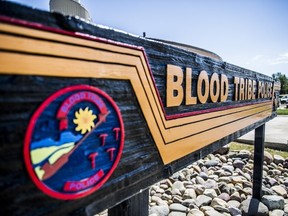

Article content
Four overdose deaths in late December prompted the Piikani Nation’s chief to declare a state of emergency in early January.
Since then, police say they have made major strides in combating the problem.
Article content
According to the province’s latest figures, there were 1,565 drug overdose deaths in the first 10 months of last year, surpassing the 1,518 in all of 2022 and on pace to eclipse the 1,878 deaths in 2021.
Advertisement 2
Article content
In the South Zone, there have been 194 overdose deaths in the first 10 months of 2023 — a per-capita rate of 72.7, almost twice that of the Calgary Zone.
But Sgt. Vince Bacon, detachment commander of the Piikani Nation RCMP, says police there have been working for a year or two on reducing opioids on the First Nation, which, on a per-capita basis, is the second most violent community in Alberta.
“We’ve increased our resources here for members, but also for the front counter, just trying to have a better control over what’s going on,” said Bacon.
Piikani Nation RCMP have been working with other police agencies, including the Calgary crime reduction unit and ALERT.
“We now have a stronger partnership to share intelligence with the Blood Tribe police,” he said. “It’s much closer than we thought when it comes to trafficking between the two nations.”
Bacon said the Piikani RCMP have a “good grip” on the drug trafficking situation, with officers developing strong intelligence on dealers.
“We don’t have major problems in the nation today,” he said. “By working with the community, we’re able to get a strong grip when it comes to local dealings.”
Article content
Advertisement 3
Article content
Piikani RCMP have raided several houses recently where drugs were being cooked.
“We locate a lot of fentanyl,” said Bacon, adding around six ounces was seized during the last bust. “Fentanyl is certainly a big issue, and crack meth is usually what we deal with here at Piikani.”
Meanwhile, at the neighbouring Blood Tribe — which last spring started a task force to combat drug trafficking and overdoses — overdose deaths are declining.
In January, the Blood Tribe recorded zero overdose fatalities.
“That’s the first time for years,” said Brian Harmatiuk, acting inspector of operations for the Blood Tribe Police Service.
The Blood Tribe had one fatal overdose death in each of October, November and December, and 26 in total last year, including eight in July.
“We think that a lot of our drug work scared away some of the dealers, that they realized that we’re keying in on them,” said Harmatiuk. “Unfortunately, a lot of it has sort of worked its way back to Lethbridge . . . Lethbridge is still suffering, Brocket (on the Piikani Nation) is still suffering.”
To help each other on drug and other files, Blood and Piikani police are sharing more information and files, said Harmatiuk.
Advertisement 4
Article content
“Even if it’s just of a general nature — if someone from their jurisdiction is arrested or is part of a file in our area — we will let them know about it,” he said.
To cut down on drug trafficking and other crimes, police services can do a better job of sharing information to build better cases, said Harmatiuk.
“There’s a lot of co-operation that needs to happen that maybe we haven’t done a good job of in the past, but we’re certainly looking forward to more open communication,” he said.
A community’s drug problem also goes hand in hand with other crimes, including theft and assault, said Harmatiuk.
“The trend in the drug use has helped mitigate some of the stolen property and those sorts of things out here,” he said.
Article content